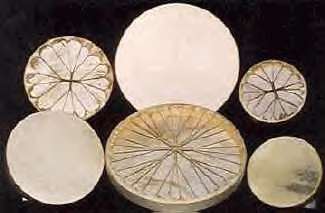|
|
Drumming..An Ancient Path to Health and Wellness
by Swift Eagle....Drum Maker
For centuries, indigenous peoples have kept alive their traditions of honoring the
Earth as sacred. Native peoples seem intuitively to have understood that human beings are coded for ritual. These
cultures have always drummed in ritual at births, deaths, weddings, harvests, and rites of passage. The drumbeat
echoes the heartbeat, connecting us to our deeper selves. It's a universal language which communes with people
from other cultures. Native people say the drumbeat also communes with the Earth, a reminder that all of creation
is alive and, therefore, sacred. Now it appears that the gift of the drum may be an antidote to modern society's
worst ills. We live on a planet which has both benefited and suffered from the advances of technology.
Stress is rampant, and its effects are visible in our physical, psychological and spiritual ills. According to current medical research, stress is a cause of 98% of all disease. Not
only heart attacks, strokes, immune system breakdowns, but every disease known, with the exception of two viruses,
has now been linked to stress. Recent biofeedback studies show that drumming along with our own heartbeats for 15
minutes alters brain wave patterns (increasing alpha) and dramatically reduces stress. So drumming actually "meditates"
us! "Drum fever is sweeping the country as people discover the physical, psychological
and spiritual rewards...even for those who can't read a note of music." --Claudia Ricci, The New York Times The uses of percussion for wellness is prolific and growing. A recent study by Barry Quinn, Ph.D., a clinical psychologist specializing in neurobiofeedback
therapy (NBT) for stress management, indicates that drumming works on even the highest-stress clients. Dr. Quinn
operates a neurobiofeedback clinic called the MindSpa Place in Colorado Springs, CO, and for nearly nine years
has been working with how a variety of techniques affect the brain waves. One of Dr. Quinn's patients, a Viet Nam veteran who has long suffered from high stress,
hyper vigilance and chronic sleep problems, regularly produced almost no Alpha in his brain wave patterns. (Alpha
is a mental relaxation state missing in nearly 40% of the population.) During a single, 30-minute session of slow,
gentle drumming using a one-sided hand drum and a beater, this patient nearly doubled his Alpha brain waves. No other technique used (including a sound and light machine) in a series of 15 stress
reduction sessions had been able to produce any Alpha in this client. Until drumming, in fact, no technique used
in the nine years of Dr. Quinn's research had been able to bring a significant return of this relaxation brain
wave in any client. He calls the effect of brief drumming sessions "by far the most amazing results I've encountered
thus far in my work." Drumming has also been used with Alzheimer's patients to focus attention, with prison
and homeless populations to promote self esteem, with war veterans to end trauma, and in corporate America to promote
team spirit-building. Other exciting applications of the drum's potential to enhance wellness are emerging as we
foster a new millennium. Some of these give us hope in situations formerly believed to be hopeless. You can pick up your drum for 15 minutes, offer a prayer of thanks to the world's indigenous
peoples, and commune with the rest of us drummers who will be, with you, at peace. This article was relayed By Swift Eagle....Drum Maker Canku Ota is a copyright of Vicki Lockard and Paul Barry.
 Interestingly,
it now appears that that most accessible tool for reconnecting with ourselves may be the drum, a gift from the
indigenous world.
Interestingly,
it now appears that that most accessible tool for reconnecting with ourselves may be the drum, a gift from the
indigenous world.
In accordance with the fair use policy of Title 17 U.S.C. section 107.
He may be contacted at Grizllbear@aol.com
![]()
Canku Ota is a free Newsletter celebrating Native America, its traditions and accomplishments .
We do not provide subscriber or visitor names to anyone. Some articles presented in Canku Ota may contain copyright
material. We have received appropriate permissions for republishing any articles. Material appearing here is distributed
without profit or monetary gain to those who have expressed an interest. This is in accordance with Title 17 U.S.C.
section 107.